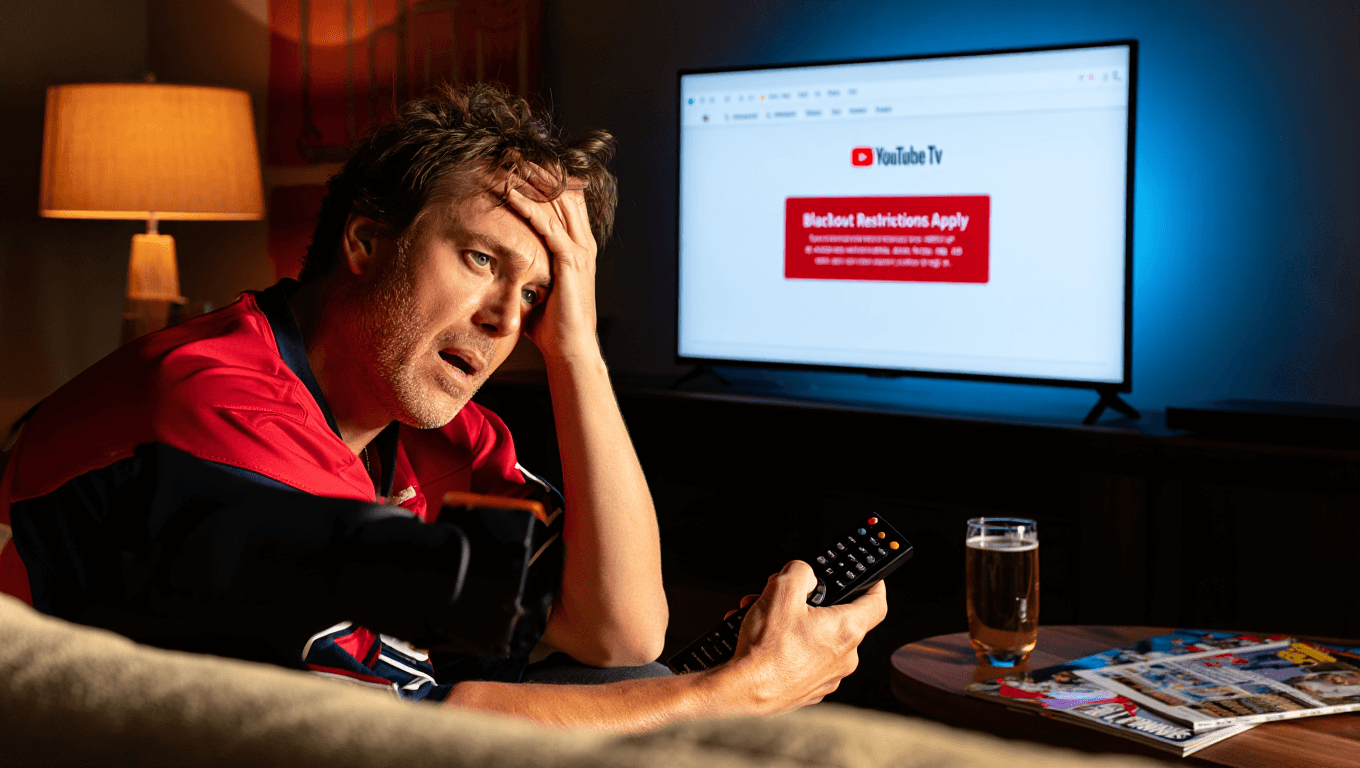NFL Sunday Ticket subscribers face a devastating financial trap. YouTube TV blocked them from canceling. The ESPN blackout started on Oct. 31, 2025. Disney and YouTube failed to reach a carriage agreement. Roughly 10 million subscribers now can’t watch games they paid for.
AMC+ Has Better Horror Than Shudder – These 6 Prove It
7 Perfect Shows Americans Can’t Legally Watch (Yet)
🔥 Quick Facts:
- $150 upfront cost for NFL Sunday Ticket in 2025 season.
- YouTube TV blocked cancellations starting Oct. 31, 2025.
- 10 million subscribers lost ESPN, ABC, and Monday Night Football.
- YouTube enforces non-refundable policy on all prepaid plans.
- Dispute centers on Disney demanding higher channel licensing fees.
YouTube TV Traps Prepaid Subscribers Without Escape
YouTube TV executed a controversial move. They disabled cancellations for prepaid Sunday Ticket subscribers. Subscribers who paid $150 upfront cannot exit without losing access.
Your Internet Speed Is Fine – The Streaming App Is the Problem
Discovery+ Documentaries Outrank Netflix Originals on IMDb
The blackout began when Disney channels went dark. ESPN, ABC, and Disney+ disappeared from the platform. YouTube refused to meet Disney’s higher licensing fee demands.
“YouTube TV subscribers who bundled Sunday Ticket can’t cancel their base plan during the ESPN blackout without losing access.”
The timing devastates football fans nationwide. Sunday games vanished from their screens. Monday Night Football disappeared too. Fans demanded refunds. YouTube refused every single one.
The Financial Damage Hits Hard
New YouTube TV customers paid $82.99 monthly for the base plan. They also paid $150 upfront for Sunday Ticket access. Total cost reaches $496.95 for just four months.
Approximately 10 million YouTube TV subscribers lost their ESPN access immediately. Monday Night Football vanished. College football games blocked. ABC programming disappeared entirely.
YouTube’s support pages state clearly: refunds don’t exist. Season passes remain non-cancelable. Subscribers trapped pay monthly fees. They watch nothing. The company keeps their money.
| Cost Breakdown | Amount |
|---|---|
| NFL Sunday Ticket (Upfront) | $150 |
| YouTube TV Base Plan (Monthly) | $82.99/month |
| Combined 4-Month Cost | $496.95 |
| Games Available Without ESPN | Significantly Limited |
| Refunds Offered | Zero |
Subscriber rage erupted across social media platforms. Reddit filled with complaints about the trap. Fans expressed fury over losing access. They questioned company ethics. They demanded accountability.
When Will The Disney Dispute End?
Disney demands higher fees for channel licensing. YouTube refuses to increase payments. Both sides hold firm on their positions. The stalemate drags forward.
Meanwhile, millions of fans remain frozen in limbo. They cannot cancel without losing everything. They continue paying YouTube each month. No games appear on their screens.
- Resolution unlikely before mid-November 2025 based on similar disputes.
- Subscribers considering legal action against YouTube TV for unauthorized charges.
- Disney showing no signs of accepting YouTube’s current offer.
- Alternative services like Hulu + Live TV gaining new subscribers daily.
- YouTube faces potential lawsuit from trapped consumers.
Who Wins In This Streaming Wars Battle?
This dispute reveals harsh streaming industry realities. Tech platforms hold all the power. Subscribers have zero leverage. Consumers absorb every loss.
YouTube made poor contract decisions initially. They agreed to expensive licensing terms. Now they won’t pay what Disney demands. Customers suffer the consequences.
Meanwhile, Apple TV+, Amazon Prime, and Hulu celebrate. Frustrated YouTube TV subscribers switch platforms. They seek reliable sports coverage elsewhere. YouTube loses millions in long-term value.
The fundamental question remains unanswered: will YouTube ever respect prepaid subscribers? Will they unlock cancellations? Will they offer prorated refunds? History suggests no.
This situation sets a troubling precedent. Streaming services can trap paying customers. They can block cancellations. They can hide behind non-refundable policies. Legal experts question this practice’s legality.

Daniel Harris is a specialist journalist focused on the crossroads of breaking news, extraordinary history, and enduring legends. With a background in historical research and storytelling, he blends timely reporting with timeless narratives, making complex events and ancient myths resonate with today’s readers. Daniel’s work often uncovers surprising links between present-day headlines and legendary tales, offering unique perspectives that captivate diverse audiences. Beyond reporting, he is passionate about preserving oral traditions and exploring how extraordinary stories continue to shape culture and identity.

